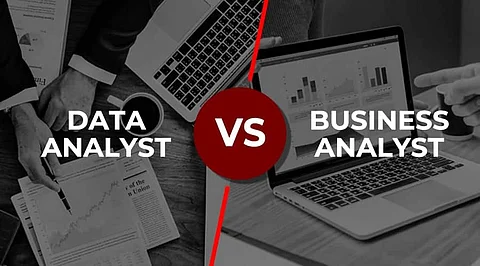

Globally, big data is reshaping and fuelling decision-making. Data from a variety of sources is helping companies expand their operations, boost sales, run more efficiently, and introduce new products or services, from huge corporations to higher education and government organizations.
Organizations must utilise both business analytics and data analytics to construct meaning of all this data and use it to become more competitive. These two locations, which can appear interchangeable, are frequently confused. We'll look at the aims of each function and compare duties and responsibilities in this post to help you determine which path is best for you.
Working with data manipulation, extracting information from data, and applying that knowledge to improve business performance are all part of business analytics and data analytics. So, what are the key distinctions between the two capabilities?
Business analytics is concerned with the greater business implications of data and the choices that should be taken as a result, like whether a corporation should launch a new product line or prioritise one project over another. The word "business analytics" refers to a set of skills, techniques and applications that allow companies to assess and enhance the efficiency of fundamental business processes like marketing, customer support, sales and information technology.
Data analytics entails sifting through large databases to find patterns and trends, draw conclusions regarding hypotheses, and use data-driven insights to support business choices. Data analysis tries to answer issues like "How does location or seasonal factors affect client preferences?" or "How likely is it that a customer will transfer to a rival company?" Data analytics is also known as data science, data mining, data modelling, or big data analytics, and it comprises a wide range of techniques and methodologies.
Business analytics (BA) is the process of iteratively exploring an organisation 's information with a focus on using statistical analytical tools to uncover insights that can assist drive innovation and financial results. Big data is treated as a significant corporate asset that feeds business planning and promotes future initiatives by analytics-driven enterprises, and business analytics assists them extract the most value from this treasure of insights.
The process of gathering and analysing raw data in order to develop conclusions about it is known as data analytics. Every company gathers vast amounts of data, whether it's sales figures, market analysis, logistics, or transaction history. The fundamental value of data analysis is its ability to identify trends, risks, and opportunities in a dataset. Businesses can utilise data analytics to improve their decision-making by changing their procedures based on what they've learnt. This could include determining which new items to introduce to the market, devising customer retention strategies or assessing the efficacy of new medical treatments.
Although both data analysts and business analysts deal with data, there is a significant distinction in what they do with it. Data is used by business analysts to assist firms in making more efficient business choices. Data analysts, on the other hand, are more concerned with acquiring and analysing data for the business to analyse and use to make independent judgments.
Data is used by business analysts to make key business decisions. Data analysts collect, manipulate, and analyse data in order to extract usable information and turn their results into understandable insights. Their ultimate purpose is to analyse data.
People in either capacity must have a passion for data, an inquisitive mind, strong problem-solving abilities, and the ability to see and strive toward the broader picture. However, understanding how these two career routes differ is critical if you're trying to choose between them.
Data is used by business analysts to discover problems and solutions, but they do not do a detailed technical study of the data. They are interested in the business ramifications of data and work at a theoretical level, establishing strategy and engaging with stakeholders. Data analysts, on the other hand, devote a good deal of time obtaining raw data from diverse sources, cleaning and transforming it, and extracting usable information and drawing conclusions using a variety of specialised approaches.
In fields like e-commerce, industry, or healthcare, business analysts often have substantial domain or industry knowledge. Although they must have a working knowledge of statistical techniques, commonly used programming languages, networking, and databases, people in this profession rely less on technical details of analysis than data analysts.
Business analysts must be skilled in modelling and collecting requirements, while data analysts must have strong business intelligence and data mining abilities, as well as knowledge of in-demand solutions like as ML and AI.
A solid foundation in business administration is a huge plus for business analysts. Many business analysts have degrees in management, business, information technology, computer science, or other relevant professions. A mathematical or information technology history, on the other hand, is advantageous for data analysts, who must be familiar with sophisticated statistics, methods, and databases.
Every company, from the smallest start-ups to the largest multinational corporations, must use data to drive innovation and commercial growth. The goals of data analytics and business analytics are similar in that they both aim to optimise data to increase efficiency and fix issues, but there are some key differences. Whatever path you take, you'll need to swiftly, efficiently, and securely obtain important, trustworthy data from a variety of sources.
Join our WhatsApp Channel to get the latest news, exclusives and videos on WhatsApp
_____________
Disclaimer: Analytics Insight does not provide financial advice or guidance. Also note that the cryptocurrencies mentioned/listed on the website could potentially be scams, i.e. designed to induce you to invest financial resources that may be lost forever and not be recoverable once investments are made. You are responsible for conducting your own research (DYOR) before making any investments. Read more here.
